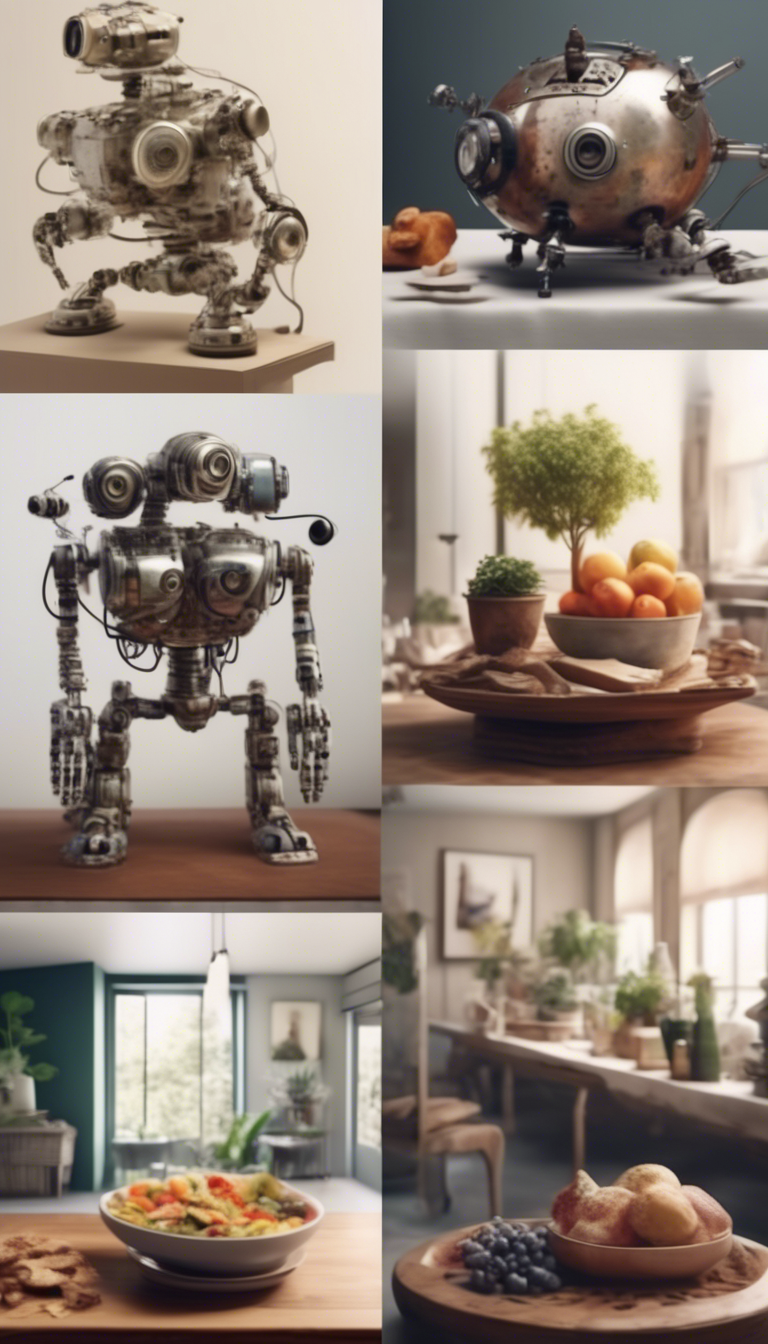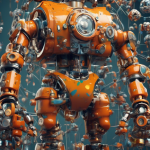Innovative AI Automation Examples Transforming Modern Industries
The landscape of modern industries is undergoing a seismic shift, thanks in large part to artificial intelligence (AI) automation. Businesses are leveraging AI to streamline their processes, reduce costs, and enhance customer experience. The following are some innovative AI automation examples that are reshaping various sectors.
Customer Service Automation
Many companies are turning to AI chatbots to revolutionize their customer service departments. These chatbots can handle inquiries round the clock, providing instant responses to common questions. For example:
- 24/7 Availability: Customers appreciate being able to get quick answers at any time of day.
- Cost Reduction: Automating support reduces the need for a large customer service team.
- Data Collection: Chatbots can gather information on customer preferences, aiding businesses in refining their services.
Healthcare Improvements
AI is not just reshaping customer service; it also plays a crucial role in healthcare. Hospitals and clinics are implementing machine learning algorithms for several innovative uses:
- Predictive Analytics: AI can analyze patient data to predict potential health issues before they arise.
- Image Diagnosis: AI tools are being used to interpret medical images like X-rays and MRIs, often with greater accuracy than human doctors.
- Appointment Scheduling: Automation helps patients schedule appointments, reducing administrative burdens on staff.
Manufacturing Efficiency
In manufacturing settings, AI is instrumental in optimizing production lines. This technology is automating repetitive tasks and improving overall efficiency. Some notable applications include:
- Quality Control: AI systems can identify defects in products during the manufacturing process, ensuring higher quality output.
- Predictive Maintenance: Utilizing AI, companies can predict when machinery is likely to fail, thus avoiding costly downtimes with timely maintenance.
- Supply Chain Optimization: AI helps analyze supply chain variables to forecast demand and optimize inventory.
Financial Services Automation
In finance, AI automation is transforming everything from loan approvals to fraud detection. Examples include:
- Automated Loan Processing: Machine learning models quickly analyze creditworthiness, speeding up the loan approval process.
- Fraud Detection: AI algorithms monitor transactions in real-time to identify and flag suspicious behavior.
- Robo-Advisors: These AI-driven platforms provide investment advice and portfolio management, making financial services more accessible.
Retail Transformation
Retailers are also tapping into AI automation to enhance customer experience and streamline operations. Here are some noteworthy innovations:
- Personalized Shopping Experiences: AI analyzes customer behavior to recommend products tailored to individual preferences.
- Inventory Management: Automatic reordering systems alert store managers when stock is running low, ensuring that popular items never run out.
- Virtual Assistants: Retailers are using AI to create virtual shopping assistants that help consumers make purchasing decisions.
Transportation and Logistics
AI automation is also making waves in transportation and logistics sectors. Notable examples include:
- Route Optimization: AI-driven systems analyze traffic patterns and weather conditions to suggest the most efficient delivery routes.
- Autonomous Vehicles: Companies like Tesla are at the forefront of developing self-driving technology, potentially revolutionizing the way goods are transported.
- Warehouse Robots: Automated robots in warehouses improve picking efficiency and accuracy, significantly speeding up the logistics process.
In this rapidly evolving technological landscape, AI automation is not just a trend; it’s a transformative force. Companies across various sectors are finding innovative ways to integrate AI into their operations. By embracing these technologies, businesses can improve efficiency, enhance customer satisfaction, and remain competitive.
As these examples illustrate, embracing AI automation can lead to smarter operations and a brighter future for industries worldwide. The possibilities are limitless, and as AI technology continues to advance, we can expect even greater innovations that will further revolutionize how we work and live.
The Impact of AI Automation on Workforce Dynamics and Employment
The advent of AI automation has drastically reshaped workforce dynamics and employment landscapes across various industries. As technology evolves, the implications of AI on job roles, responsibilities, and overall employment remain a critical subject for discussion.
One of the most significant impacts of AI automation is the enhancement of productivity. By taking over repetitive and mundane tasks, AI allows human workers to focus on higher-order responsibilities. This shift not only boosts efficiency but also encourages creativity and critical thinking among employees. For example, in manufacturing, AI-powered robots can perform assembly line tasks faster and with fewer errors than humans. This transformation redefines job roles, pushing workers toward positions that require a greater skill set.
However, while productivity gains are undeniable, there are valid concerns regarding job displacement. As certain tasks become automated, entire job categories may face obsolescence. Industries like retail and customer service have already witnessed a decline in positions such as cashiers and support staff due to the implementation of AI-driven kiosks and chatbots. The challenge for workers is now to adapt and upskill in alignment with the changing job market.
- Examples of AI Automation Impacting Employment:
- Manufacturing: Robots handle assembly and quality control tasks.
- Healthcare: AI systems assist in patient diagnosis and treatment recommendations.
- Finance: Automated trading platforms manage investments and risk assessments.
- Transportation: Self-driving technology threatens traditional driving jobs.
- Benefits of Upskilling:
- Increased employability in high-demand fields.
- Enhanced job satisfaction and morale.
- Greater adaptability to future technological advancements.
As we explore the broader implications of AI automation, it’s essential to highlight the importance of reskilling and educational programs. Workers need opportunities to learn new skills that will become increasingly valuable in an automated environment. Companies can provide training sessions or partner with educational institutions to ensure their workforce is prepared for future demands. This proactive approach not only mitigates job loss but also cultivates a more versatile and capable workforce.
Moreover, the integration of AI into workplaces often leads to the emergence of new job types. Roles focused on AI maintenance, development, and ethical governance are expanding. Data scientists and machine learning specialists are in high demand and represent just a fraction of newly created positions. As industries adapt, it’s likely that many workers will transition into these new roles within the tech-driven economy.
Another critical aspect to consider is the ethical implications of AI automation. The decision-making processes in AI systems must be transparent and accountable to prevent biases that could adversely affect employment opportunities. Organizations should strive to develop AI algorithms that promote inclusivity and fairness in hiring practices so that automation doesn’t exacerbate existing inequalities in the workforce.
In addition, employers should foster a culture where human-AI collaboration is emphasized. Instead of viewing AI as a replacement, organizations can position it as a tool that complements human skills. For instance, in sales, AI can analyze customer data and predict buying behaviors, while human employees can leverage these insights to build successful relationships. This synergistic approach not only enhances productivity but also reinforces the value of human intuition and emotional intelligence in the workplace.
The global economy stands to benefit significantly from AI automation, potentially increasing overall productivity and stimulating economic growth. However, stakeholders must remain vigilant and responsive to its potential social implications. Balancing technological advancement with ethical considerations will be critical to ensuring that the workforce evolves positively rather than detrimentally.
AI automation’s impact on workforce dynamics and employment is profound and multifaceted. While it may displace certain jobs, it also creates opportunities for innovation, growth, and the development of new roles. Employers and employees alike must adapt, embracing upskilling, ethical considerations, and the potential for collaboration with AI. Together, these strategies hold the key to thriving in a future where AI is an integral part of the workforce.
Conclusion
As we traverse this era of exponential technological advancement, the innovative AI automation examples showcased undoubtedly illuminate the vast potential and transformative power of artificial intelligence across various industries. From manufacturing to healthcare and everything in between, AI is not just a tool; it’s reshaping the very fabric of how businesses operate, making them more efficient, responsive, and capable of handling complexity at unprecedented scales.
In the manufacturing sector, AI automation is revolutionizing production lines through smart robotics and machine learning. Factories are now equipped with cobots—collaborative robots able to work alongside humans—enhancing the speed and precision of tasks such as assembly and quality control. This shift reduces human error while allowing workers to focus on higher-level problem-solving tasks. The automotive industry, for instance, is witnessing real-time data analytics optimize supply chains and manage inventory effectively, ensuring vehicles are produced just-in-time to meet consumer demands without overburdening resources.
Healthcare also benefits immensely from AI automation, driving advancements in patient care. Automated appointment scheduling, virtual health assistants, and advanced diagnostic algorithms are paving the way for personalized medicine. AI systems can analyze vast amounts of patient data faster than human specialists can, offering treatment suggestions that rely on historical outcomes and the latest research. This synergy of human expertise and AI capability not only increases efficiency but significantly enhances patient outcomes. Healthcare providers can now focus their energies on patient care while automation handles administrative tasks.
The financial services industry has also embraced AI automation, with robo-advisors rapidly becoming commonplace. These automated investment platforms analyze user data and offer financial advice at a fraction of the cost of traditional wealth management services. Additionally, AI algorithms are instrumental in fraud detection, analyzing spending patterns in real time to flag suspicious transactions before they escalate into significant breaches. Such capabilities not only save time for companies but also protect consumers, ultimately fostering trust in digital financial solutions.
Despite the myriad benefits of AI automation, it’s essential to recognize its impact on workforce dynamics and employment. As organizations implement these sophisticated technologies, the demand for specific skill sets has undoubtedly shifted. While some job roles may become obsolete, AI creates new opportunities that require a different mix of technical and soft skills—this is where the future workforce must adapt. Upskilling and reskilling are becoming crucial strategies for both employees and organizations to thrive in this evolving landscape. Workers now need to pivot towards understanding AI systems or leverage data analytics skills that align better with future job markets.
Moreover, businesses also play a role in creating an environment that values human capital. While automation can increase efficiency, the human touch is irreplaceable in various fields such as customer service, strategic decision-making, and creative industries. Companies that successfully blend AI automation with employee insight are likely to see enhanced innovation and improved morale. Understandably, resistance may arise from the workforce, stemming from fears of job losses. It’s essential for organizations to communicate the benefits of AI and lead efforts to foster a culture of collaboration between humans and machines, promoting an image of AI as an ally rather than a threat.
Looking ahead, the adoption of AI automation is poised to redefine industries further, with advancements in areas like natural language processing and predictive analytics expanding the possibilities. Many companies are starting to explore ethical AI, a focus that underscores the importance of responsible tech use, ensuring that automation enhances rather than dehumanizes the workplace. This commitment to ethical practices can help smooth over workforce anxieties while fostering innovation.
AI automation serves as a catalyst for change, making industries more efficient and improving service delivery across sectors. As we witness these advancements transforming our everyday lives, it’s clear that both individuals and organizations must remain vigilant, responsive, and adaptive. Embracing AI without losing sight of the human element is paramount in navigating this technology-driven landscape. The future is not solely about automation; it is about harmonizing human intellect with AI’s capabilities to create a balanced, innovative, and productive society.


